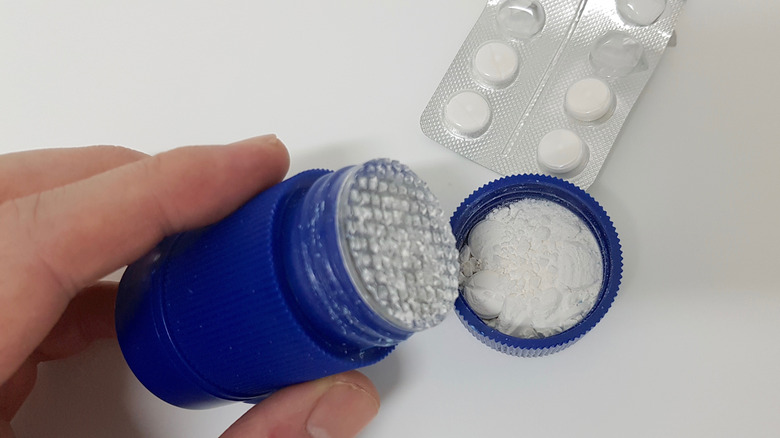Here's What Really Happens If You Chew A Pill
If a person you are caring for has problems swallowing their pills, you may be tempted to crush them and put them in their food or allow them to chew the pills for easier ingestion. Depending on the medication, however, this could be a bad idea.
Chewing or crushing a pill may decrease how effective the medication is or increase the likelihood of side effects or an overdose, according to Verywell Health. ConsumerMedSafety adds that some pills may have a special coating that protects the stomach from irritation or delays the release of the pill's ingredients. Crushing the pill would allow the drug to be released too soon, either harming the stomach or causing it to take effect too soon. Additionally, The Hospitalist notes that many medications have a bad taste, which may cause patients to avoid taking their necessary medicine. Also, they say sublingual or effervescent medications could be less effective if crushed.
Pills that should never be crushed or chewed
Verywell Health explains that there are three types of pills that should never be crushed or chewed. The first type is enteric-coated pills. These pills have a coating on them that is designed to dissolve slowly so that the drug is not released until the pill reaches the small intestine. This prevents the drug from irritating the delicate lining of the stomach. These drugs sometimes have "EN" or "EC" at the end of the brand name to indicate the presence of an enteric coating.
The second type is sustained-release drugs. These pills are designed so that they dissolve slowly, releasing the medication over time. If they are crushed or chewed, all of the drug is released immediately. This can cause the initial dose to be higher than desired, which can lead to greater side effects or risk of overdose. In addition, the drug can leave the body more quickly than intended. Sustained-release medications often have "CR" (controlled-release), "ER" or "XR" (extended-release), or "DA" (delayed-action) as a part of their brand names.
The third type is opioid medications. Opioids, also known as narcotics, must be released in a slow, controlled way due to their potential for addiction. If they enter the bloodstream quickly, this can create a stronger effect, increasing the potential for drug tolerance and dependence.


